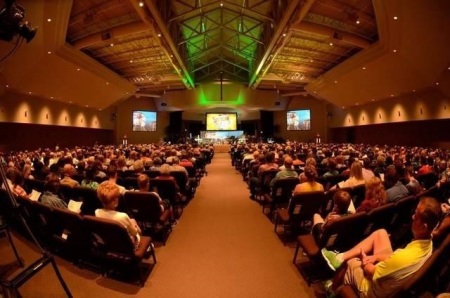Assemblies of God head warns church on election season: Don't let division seep in

In a pastoral letter, Doug Clay, the head of Assemblies of God, urged the leaders of the denomination’s 13,000 congregations in the United States to be “extremely cautious” as the upcoming election season will “certainly” be divisive. While maintaining spiritual unity, he said, they should advocate for biblical justice and liberty.
“Polarization and politics naturally go together,” wrote Clay, the general superintendent of the Assemblies of God, USA. “It’s the Spirit who brings unity.”
“Polarization in 2020 has risen to a higher level and has trickled down to even mundane decisions,” the AG leader acknowledged. “We should be extremely cautious that we do not allow division to seep into Christ’s Church that will inevitably lead to self-destruction.”
Clay called on the church leaders to focus on the denomination’s mission, which is “evangelism, worship, discipleship, and compassion,” and not on politics.
He noted that it’s “becoming more and more difficult to be salt and light in our culture,” as the “changing realities of politics aren’t helping us to fulfill our mission.”
His comments come as a Pew survey shows that a growing percentage of Americans (currently 91%) believe conflicts between Republicans and Democrats are strong. The Pew Research Center said in October 2019 that "the level of division and animosity – including negative sentiments among partisans toward the members of the opposing party – has only deepened."
Amid such division in the country, Clay urged, “While others may be focused on endless debates and the things that divide society, the Church should be known for sharing the hope of the gospel. Don’t let the news make you bitter against those who lack faith in Christ. Let it motivate you to be all the more committed to evangelism.”
Talking about the importance of worship, he wrote, “Of all people, God’s people should know that our answers are not in politicians, but in the power of Christ. Like Nehemiah, may our hearts grieve for our nation and may we intercede in fasting and prayer. Nothing is too hard for God!”
The denomination’s members and adherents “need a biblical understanding of the issues we are facing in our society in order to make informed decisions in the voting booth,” he said.
While he didn’t make any specific references to issues America is currently dealing with, from responses to the COVID-19 pandemic to the ongoing demonstrations for racial justice, Clay listed five key long-term issues: biblical justice, religious liberty, sanctity of life, marriage and family, and court appointments.
Advocating for the poor and the downtrodden in society is God’s work, he pointed out. “For the Church, the chief tool in this advocacy is the gospel itself.”
Religious freedom, Clay continued, “is far more than just freedom to worship in a church setting.”
“It means that people should not have to go against their beliefs to conform to the government. Religious freedom protects the right to speak and live according to our beliefs, peacefully and publicly.”
On sanctity of life, he noted that nearly one in five new lives in the country is snuffed out before their first breath, quoting stats by pro-choice organization the Guttmacher Institute.
Clay called the family "God’s original building block of society, it’s the foundation for every dimension of human life.” But “opponents of marriage seem to be relentless at removing this foundation of civilization.”
On court appointments, he noted that it’s “easy to focus on the executive and legislative branches of government,” but “it’s becoming increasingly common for judicial interpretations and rulings to have a profound impact on moral aspects of our society.”
He stressed that each decision should be based on “its impact on the Kingdom of God and on our neighbors.”
"In doing so, we make sure our priorities are His priorities and that we are others-centered rather than self-centered," he said.





















